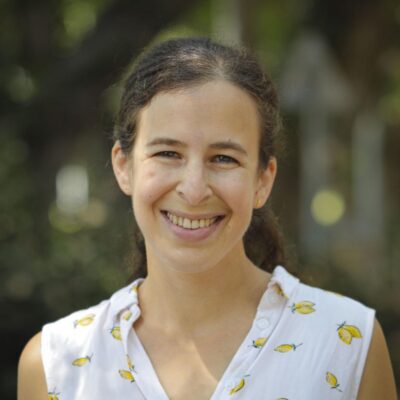Postdoc Spotlight: Inbal Ravreby

September 19, 2025
Inbal Ravreby is a postdoc in the department of psychology from Jerusalem, Israel. She earned her Ph.D. from the Weizmann Institute of Science, and her research focuses on self-other blurring. She is a recipient of a Postdoc Achievement Award for Excellence in Leadership as part of Cornell’s celebration of National Postdoc Appreciation Week 2025.
What is your area of research, scholarship, or work and why is it important?
I study self-other blurring and the nuances that make a difference in interactions. To do that, I focus on what makes us feel as if we are “one” and what enables self-other distinction, or understanding of the self-other boundaries, at the very basic level. To do this, I use behavioral, physiological, and neural measures as well as computational tools. Feeling deeply connected is grounding and life-changing. While it’s easy to see others as the “other,” and judge others while avoiding real-life complexities and putting people in boxes, there are many mechanisms through which we tend to automatically build bridges and form strong bonds. This could happen when, through our senses, a unique link between our internal world (the self) and the external world (others) is formed, especially based on (subconscious) self-reference comparison. I want to understand what blurs the boundaries between us, whether it’s similarity at different levels, synchronization, a sense of an expanding self, or the absence of self.
What are the broader implications of this research, scholarship, or work?
Many people are very quick to put a tag of “other” on someone else, or simply feel this way. However, an immediate “click” with someone, which feels almost magical as if we have been very close friends for years, also happens spontaneously, and is very powerful. Understanding what makes us feel that someone is a part of ourselves or is distinct can help improve communication at all levels—whether verbally, or through the way we move, through our facial expressions, physiology, and our neural synchronization. Understanding the underlying mechanisms behind what makes us feel connected and what makes us feel apart is key to building bridges between people and fostering social bonding.
What does receiving a Postdoc Achievement Award mean to you?
It feels like people around me see my scientific and leadership approach, care, and truly support me. It is touching that undergraduate and graduate mentees nominated me, along with Ph.D. students, postdocs, and professors I collaborate with. Perhaps most significantly, receiving this award reinforces my commitment to rigorous science that serves society and is fundamentally about real-life interactions. Studying a topic that is so relevant to people’s daily experiences, and doing so through collaborations of all kinds, and through shared facilities that we can improve for all, is exciting. It really means a lot to me that the Cornell community acknowledges my contribution.
What hobbies or activities do you enjoy in your spare time?
I enjoy being with friends and being in nature, and being with friends in nature is even better. I enjoy birdwatching, seeing all kinds of wildlife around, and seeing the plants. I love feeling blurred with the environment, being a part of it, and observing. I enjoy taking the time to look, feel, and think. I learn from all kinds of behaviors one can see in nature, and appreciate the beauty. Another big hobby of mine is professional photography. Taking photos of wildlife is my favorite, but plants, landscape, and people are definitely there too. It helps me look from multiple angles, see the birds up there and the tiniest insects and flowers, and feel connected to the environment on multiple levels.
Why did you choose Cornell?
Being passionate about studying affective psychology/neuroscience and self-other blurring through an interdisciplinary approach, and looking for a peaceful life full of nature in a college town, Cornell, the psychology department, and the area we live in were a perfect choice for me. I also couldn’t refuse the opportunity to be a Klarman Fellow. It is such a great postdoc opportunity.
What is next for you?
I want to open my own lab and study self-other blurring and self-environment blurring from a one-person perspective, in real-life dyadic interactions, and through group dynamics. I want to do this at the behavioral, physiological, and neural levels, taking advantage of the unique technology that we have nowadays to study real-life interactions and design manipulations that we couldn’t have before because of technological barriers that no longer exist. I want to open my lab in a place close to nature, and be involved in the community to help bridge self-other and self-environment boundaries based on my scientific findings and those of others.
Do you have any advice for current graduate students?
Go with your passion. If you have a sparkle in your eyes, you will enjoy, or at least be okay with, the challenging parts. Also, people will feel your passion and enjoy collaborating with you and thinking with you. Study something that you think about when you go to bed, that you wake up wanting to do, and that is still interesting as time passes. Also, be flexible, and go with big questions that you really want to know the answers to, especially if you believe you have a unique contribution to answering them. I recommend thoroughly thinking about your research and the questions you are interested in with anyone you enjoy thinking with. This is a great way to look from a different perspective, and often friends who are completely outside our fields may give us great ideas or food for thought.
